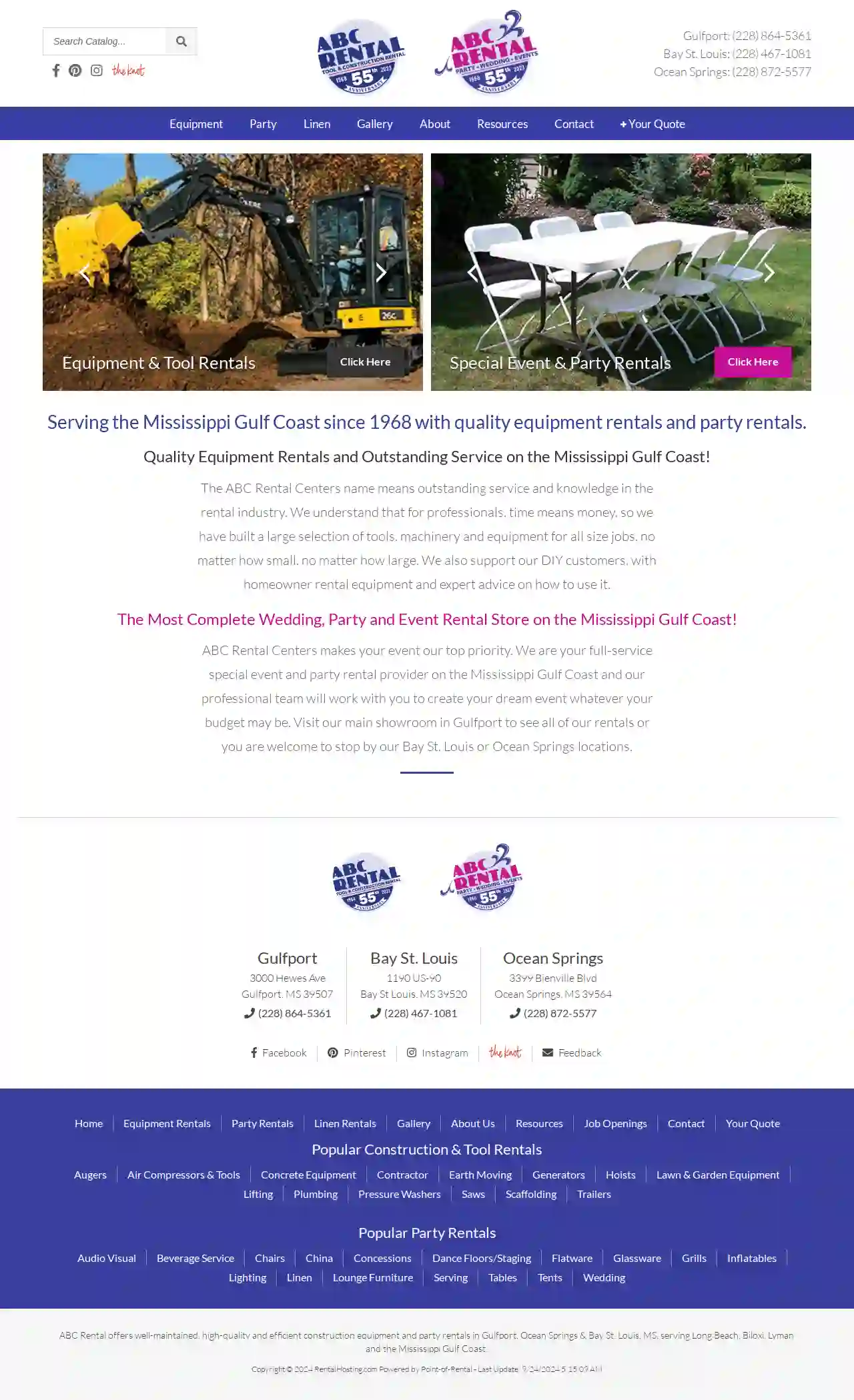Scaffolding Companies Cleveland
Top Scaffolding Company in Cleveland
Receive up to 3 Scaffolding Companies quotes for your project today! Compare profiles, reviews, accreditations, portfolio, etc... and choose the best deal.
Service Needed
City or Town

ABC Rental Center
4.4151 reviews3000 Hewes Ave, Gulfport, 39507, USABC Rental offers well-maintained, high-quality and efficient construction equipment and party rentals in Gulfport, Ocean Springs & Bay St. Louis, MS, serving Long Beach, Biloxi, Lyman and the Mississippi Gulf Coast. With a wide range of equipment and party rentals, ABC Rental is dedicated to providing outstanding service and knowledge in the rental industry.
- Services
- Why Us?
- Gallery
Get Quote- Ma
Magnolia Masonry of South Mississippi LLC
4.914 reviewsGulfport, US- Services
- Why Us?
Get Quote - Th
The Home Depot
4.2Gulfport, US- Services
- Why Us?
Get Quote - Cr
Crom Equipment Rentals Inc
Gulfport, US- Services
- Why Us?
Get Quote - Lo
Lowe's Home Improvement
4.1Gulfport, US- Services
- Why Us?
Get Quote
Over 2,353+ Scaffolding Businesses onboarded
Our scaffolding experts operate in Cleveland & surroundings!
ScaffoldingHQ has curated and vetted Top Scaffolding Businesses in Cleveland. Find a top & trustworthy pro today.
Frequently Asked Questions About Scaffolding Companies
Find answers to common questions about scaffolding companies and hiring scaffolding contractors in the USA.
- Online Directories: Use specialized directories like ScaffoldingHQ to search for scaffolding companies in your area.
- Search Engines: Use Google or other search engines to search for 'scaffolding companies near me' or 'scaffolding rental [your location]'.
- Local Construction Associations: Contact local construction associations for recommendations.
- Word-of-Mouth Referrals: Ask friends, family, or colleagues for recommendations based on their past experiences.
- Tube and Clamp Scaffolding: A traditional and versatile system using individual tubes and clamps. It's highly adaptable but requires more time to erect.
- System Scaffolding: Pre-engineered systems with modular components that fit together quickly. They offer speed and efficiency, especially for larger projects.
- Suspended Scaffolding: Hung from a roof or overhead structure, ideal for high-rise buildings or areas with limited ground access.
- Mobile Scaffolding: Mounted on wheels, allowing easy movement around a worksite. Suitable for tasks like painting or plastering.
- Specialized Scaffolding: Cantilever scaffolding, rolling towers, and other specialized systems cater to specific needs.
- Workers: Consider the number of workers on the scaffolding at any given time.
- Materials: Include the weight of building materials, tools, and equipment being used on the platform.
- Environmental Factors: Factor in potential loads from wind or snow, especially for taller scaffolding structures.
- Work at Height Regulations 2005: Covers all work at height and outlines the need for risk assessments, competent erectors, and safe equipment.
- Construction (Design and Management) Regulations 2015 (CDM): Applies to construction projects and requires planning for scaffolding safety throughout the project lifecycle.
- British Standard BS EN 12811: Sets standards for the design, manufacture, and testing of scaffolding components.
- NASC (National Access & Scaffolding Confederation) Guidance: Provides industry best practices and safety recommendations for scaffolding.
How can I find scaffolding companies near me?
Finding local scaffolding companies is easy:
What are the different types of scaffolding?
Several types of scaffolding are used in construction, each suited for different applications:
What is the weight limit for scaffolding?
The weight limit for scaffolding varies depending on the type of scaffolding, its design, and the materials used. The scaffolding should have a load capacity that safely accommodates the combined weight of:
What are the safety regulations for scaffolding in the USA?
Scaffolding safety is paramount. In the USA, strict regulations govern the erection, use, and dismantling of scaffolding. Key regulations include:
How can I find scaffolding companies near me?
Finding local scaffolding companies is easy:
- Online Directories: Use specialized directories like ScaffoldingHQ to search for scaffolding companies in your area.
- Search Engines: Use Google or other search engines to search for 'scaffolding companies near me' or 'scaffolding rental [your location]'.
- Local Construction Associations: Contact local construction associations for recommendations.
- Word-of-Mouth Referrals: Ask friends, family, or colleagues for recommendations based on their past experiences.
What are the different types of scaffolding?
Several types of scaffolding are used in construction, each suited for different applications:
- Tube and Clamp Scaffolding: A traditional and versatile system using individual tubes and clamps. It's highly adaptable but requires more time to erect.
- System Scaffolding: Pre-engineered systems with modular components that fit together quickly. They offer speed and efficiency, especially for larger projects.
- Suspended Scaffolding: Hung from a roof or overhead structure, ideal for high-rise buildings or areas with limited ground access.
- Mobile Scaffolding: Mounted on wheels, allowing easy movement around a worksite. Suitable for tasks like painting or plastering.
- Specialized Scaffolding: Cantilever scaffolding, rolling towers, and other specialized systems cater to specific needs.
What is the weight limit for scaffolding?
The weight limit for scaffolding varies depending on the type of scaffolding, its design, and the materials used. The scaffolding should have a load capacity that safely accommodates the combined weight of:
- Workers: Consider the number of workers on the scaffolding at any given time.
- Materials: Include the weight of building materials, tools, and equipment being used on the platform.
- Environmental Factors: Factor in potential loads from wind or snow, especially for taller scaffolding structures.
What are the safety regulations for scaffolding in the USA?
Scaffolding safety is paramount. In the USA, strict regulations govern the erection, use, and dismantling of scaffolding. Key regulations include:
- Work at Height Regulations 2005: Covers all work at height and outlines the need for risk assessments, competent erectors, and safe equipment.
- Construction (Design and Management) Regulations 2015 (CDM): Applies to construction projects and requires planning for scaffolding safety throughout the project lifecycle.
- British Standard BS EN 12811: Sets standards for the design, manufacture, and testing of scaffolding components.
- NASC (National Access & Scaffolding Confederation) Guidance: Provides industry best practices and safety recommendations for scaffolding.